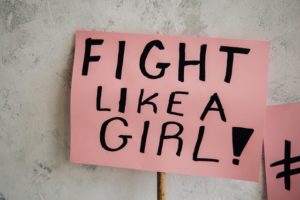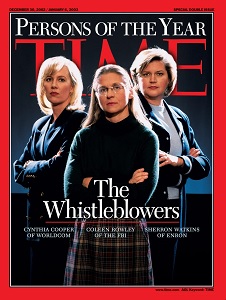Honoring Women Who Have Become Whistleblowers

March is Women’s History Month in countries including the United States and the United Kingdom, and March 8th is celebrated as International Women’s Day. International Women’s Day is both a celebration of the many achievements of women, and a day to call for action to accelerate women’s equality. In this spirit, the whistleblower attorneys at Constantine Cannon would like to honor the unique contributions made by the many women who have chosen to step forward as whistleblowers. In recognizing their courage, we also acknowledge the unique challenges that women may face as whistleblowers, and stand ready to help tell their stories.
Whistleblowers expose cheating, corruption and abuses of power. As whistleblowers bring forward evidence that might otherwise stay hidden, they are often our best hope to bring wrongdoers to accountability.
Notable women whistleblowers
While discussion of famous whistleblowers often focuses on male examples, the contributions of women whistleblowers are significant. Many discussions of whistleblowers – and, particularly, discussions of women as whistleblowers – begin with reference to Time Magazine’s three persons of the year in 2002:
 Enron executive Sherron Watkins, who warned Enron’s CEO that the company’s fraudulent accounting practices endangered the company.
Enron executive Sherron Watkins, who warned Enron’s CEO that the company’s fraudulent accounting practices endangered the company.- Cynthia Cooper, who, as vice president of internal audit at telecom giant Worldcom, investigated and alerted the board to accounting irregularities that resulted in $3.8 billion in overstated revenue.
- FBI Special Agent Coleen Rowley, who exposed failures by the FBI that she claimed left the U.S. vulnerable to the September 11th attacks.
The three women were hailed as heroes – although, like many whistleblowers, they noted that they were just doing their jobs. The naming of three women to the magazine’s honor was also historical. In honoring their selection in a an op-ed that same year, Anita Hill noted that while Cooper and Rowley had both risen “through the ranks of male-dominated industries to become insiders,” that history of male dominance meant that they remained “outsiders as well.” This status, she writes, “may have caused them to consider whether their gender would be used as the basis for ignoring their complaints or attacking them as malcontents in retaliation for their criticisms.” And, she concludes, it was perhaps their experiences as women going up against powerful male-dominated institutions that “deepened their commitment” to bringing about change.
These three women hardly stand alone as women whistleblowers. While any list will leave off women meriting recognition, we would like to honor those listed here, many of whom we have previously honored among our Whistleblower of the Year candidates – and winners.
- Nora Armenta, who warned her superiors for years that governments were being sold waterworks parts that were made with 40% more lead than allowed by industry standards, before ultimately filing an action under the False Claims Act.
- Halifax Health Medical Center whistleblower Elin Baklid-Kunz, who exposed how the hospital compensated certain physicians to induce hospital referrals and in many cases, unnecessary surgeries altogether.
- Erika Cheung, who reported to authorities about fraud at her then-employer Theranos, and who continues to speak out for business ethics practices.
- GlaxoSmithKline whistleblower Cheryl Eckard, whose action alleging that the company knowingly sold contaminated baby ointment and an ineffective antidepressant resulted in a $750 million settlement.
- Aicha Elbasri, a former U.N. official who went public with claims that the U.N. covered-up war crimes in Darfur.
- Alayne Fleischmann, who, after being ignored by her superiors, went to the SEC and DOJ with evidence that her employer JP Morgan Chase was manufacturing and selling mortgage-backed securities that did not meet its own credit requirements. The bank ultimately paid $13 billion in a settlement with the government.
- Christine Blasey Ford, who bravely came forward with evidence regarding Justice Brett Kavanaugh
- Tech whistleblower Susan Fowler, who reported on sexual harassment and institutionalized sexism at Uber
- Florida COVID data tracker Rebekah Jones, who says she was terminated from her government position for refusing to manipulate the data to paint a rosier picture of Florida’s COVID crisis.
- Brittany Kaiser, who provided evidence that her then-employer Cambridge Analytica misused Facebook data to unlawfully influence elections in the U.S. and U.K.
- Dr. Pamela McPherson, who reported on the treatment of children in immigrant detention
- Catholic church whistleblower Siobhan O’Connor, our 2018 Whistleblower of the Year, who went public with documents regarding the church’s protection of priests who had been credibly accused of sexually abusing both children and adults.
- Carmen Segarra, who was fired from her position at the NY Federal Reserve in 2012 after reporting her findings of misconduct by Goldman Sachs.
- Flint water whistleblower LeAnne Walters
- Reality Winner, who was sentenced to federal prison for leaking a classified government report on Russian hacking attacks against local election officials and voter registration data.
- Nurse Dawn Wooten, who described substandard care of detainees at U.S. immigration detention facilities and alleged that women detainees had been given medically-unnecessary hysterectomies without informed consent.
- The Weinstein Whistleblowers, referring to the dozens of women who worked with journalists to report on abuses by Harvey Weinstein
- Wells Fargo whistleblowers Yesenia Guitron and Jodi Klosek
- Mary Willingham, who went public about UNC’s failures in educating athletes.
- Sophie Zhang, who reported that her former employer Facebook ignored widespread global political manipulation on its platform and failed to take action against external threats.
The challenges facing women whistleblowers – and how we can all work to improve outcomes for women whistleblowers
As we have previously written, there are a number of theories about women’s roles as whistleblowers. Some argue that women are more driven than men by a concern for ethics. At the same time, women are argued to be less trusting of institutions and, accordingly, more likely to go outside of their organization to report issues.
But, whether driven by a concern for ethics, or a mistrust of their employer, a whistleblower’s experience does not end when she decides to blow the whistle. Indeed, for many, it is just the beginning. As whistleblower lawyers, we know that our clients have often worked for years to effect change before they call us.
Whistleblowers – male and female – often experience retaliation and other adverse consequences from their whistleblowing, and there is evidence that women suffer more direct retaliation as whistleblowers. One study in 2008 found that women who reported wrongdoing within their organizations experienced more retaliation than men who did the same. And, while higher-ranking men who reported wrongdoing experienced less retaliation, higher-ranking women were not as insulated. But, the researchers found, this did not deter women from reporting wrongdoing. “The more retaliation they faced, the more likely women were to keep fighting the battle over what they felt was wrong.”
Whistleblowers face other adverse consequences as well, and not only from those they accuse. Whistleblowers often are seen as disloyal, as cranks who are unnecessarily rule-bound, or as alarmist. Many women recognize how quickly these criticisms can acquire additional power when gender at issue: women whistleblowers were “not team players,” they were simply “too strict,” or “didn’t understand the system.” Even that they are “hysterical.” These terms reflect implicit biases carried by many against not just whistleblowers, but against women specifically. And, they carry a sting.
For women who proceed as whistleblowers, whistleblower reward laws are a critical tool. Whistleblower reward laws provide not just financial incentives, but also provide other benefits including anti-retaliation rules, clear reporting procedures, and confidentiality. Moreover, whistleblower protection and reward laws provide whistleblowers the opportunity to be represented by counsel. The whistleblower process can be lengthy, lonely, and frustrating, and women going through it can face particular challenges. All who work with women as whistleblowers – investigators, government counsel, the courts, and, of course, their lawyers – must be mindful of these challenges, so that the courage of women whistleblowers can continue to benefit us all.
Read More:
- I think I have a whistleblower case
- The Constantine Cannon Whistleblower Team
- Whistleblower FAQs
- Contact us for a confidential consultation
Tagged in: Importance of Whistleblowers,